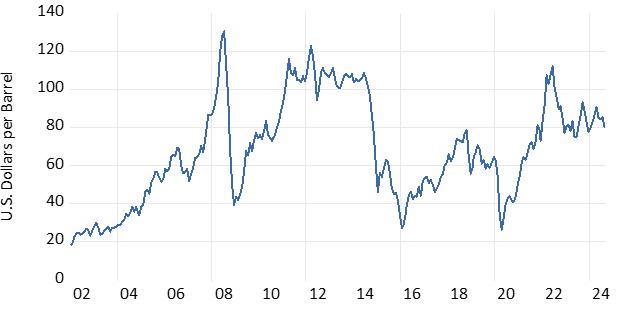| Author Name | Willem THORBECKE (Senior Fellow, RIETI) |
|---|---|
| Research Project | Economic Shocks, the Japanese and World Economies, and Possible Policy Responses |
| Download / Links |
This Non Technical Summary does not constitute part of the above-captioned Discussion Paper but has been prepared for the purpose of providing a bold outline of the paper, based on findings from the analysis for the paper and focusing primarily on their implications for policy. For details of the analysis, read the captioned Discussion Paper. Views expressed in this Non Technical Summary are solely those of the individual author(s), and do not necessarily represent the views of the Research Institute of Economy, Trade and Industry (RIETI).
Dubai crude oil prices rose from $26 per barrel in April 2020 to $112 in June 2022 and back to $80 in August 2024 (see Figure 1). For Indonesia 43% of its total energy consumption and for South Korea 54% of its total energy consumption are oil or oil products. Much of this oil is imported. How do high and volatile oil prices affect the Indonesian and Korean economies?
Oil price increases transfer wealth from net oil importers such as Indonesia and Korea to oil exporters (Golub, 1983). Since stocks are one of the primary stores of net wealth for a country, oil price increases might decrease their aggregate stock prices.
This paper investigates how Dubai crude oil prices affect aggregate and sectoral stock prices in Indonesia and Korea. Since finance theory teaches that stock prices equal the expected present value of future cash flows, investigating how oil prices impact sectoral stock returns can shed light on how they will impact sectoral sales, earnings, and investment.
This paper uses Hamilton's (2014) approach to divide oil price changes into portions due to global aggregate demand and due to oil supply. The results indicate that several sectors in Indonesia and Korea gain during times of high oil prices if price increases are driven by increases in global demand. In Indonesia these include coal, iron and steel, and paper and in Korea these include iron and steel, shipbuilding, and commercial vehicles. The results also indicate that several sectors are harmed by oil price increases, whether driven by aggregate demand or by supply side factors. In Indonesia these include drug and grocery stores, consumer staples, tobacco, and telecommunication service providers and in Korea these include airlines, drug and grocery stores, consumer staples, food producers, industrial transportation, and cosmetics.
The finding that some sectors gain and some lose from oil price increases has policy implications. In Indonesia the government subsidizes gasoline prices. In 2023, the government paid 132.44 trillion rupiah (8.4 billion USD) to subsidize the popular 90 octane gasoline Pertalite. The results indicate that several sectors in Indonesia gain from higher oil prices. Providing blanket subsidies to all users of gasoline ignores that fact that some parts of the economy gain when oil and gasoline prices increase. It also ignores the fact that wealthier households tend to use more energy and thus benefit more from fuel subsidies than poorer households. Subsidies crowd out government spending on social programs and other priorities. Although it would be politically painful, the government should reform fuel subsidies to target poor consumers and others who suffer from high fuel prices.
The results indicate that many sectors in Indonesia and especially in Korea suffer from oil price increases. This highlights the priority of reducing oil consumption. Transitioning away from fossil fuels is also essential for combatting climate change. One problem is that renewable energy sources can be more expensive and unpredictable than fossil fuels. Clean energy relies on sunshine, wind, and other factors that are often intermittent. If Korea could partner with its Northeast Asian neighbors, they could together develop more affordable and reliable sources of renewable energy. Indonesia could incentivize the use of solar panels by allowing users to sell excess energy back to the grid at market prices.
Promoting the use of electric vehicles (EVs) instead of internal combustion engine vehicles could also reduce their dependence on oil. Both Indonesia and Korea provide subsidies to promote the sale of EVs. Research has indicated that increasing the number of charging facilities and ensuring their full functioning is more cost-effective than providing consumers with subsidies. It is also important to raise the quantity and quality of charging infrastructure at travel hubs such as highway rest stops.
Oil prices have been high and volatile. High oil prices harm several sectors in Indonesia and Korea. Volatile prices whipsaw many sectors. To protect vulnerable sectors and to reach net zero emissions goals, both countries should prioritize transitioning from oil and other fossil fuels to sustainable energy sources.

- Reference(s)
-
- Golub, S. 1983. Oil Prices and Exchange Rates. The Economic Journal 93, 576–93.
- Hamilton, J., 2014. Oil Prices as an Indicator of Global Economic Conditions. Web blog post. Econbrowser.com, 14 December.

